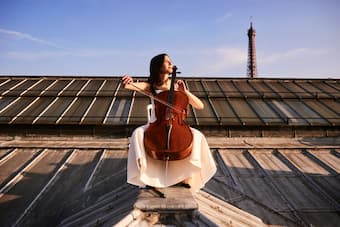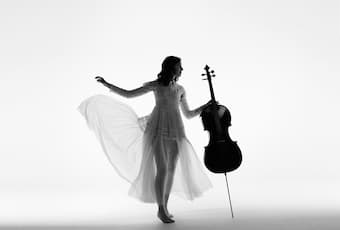“Everything in the World is an Inspiration”

Camille Thomas © Dan Carabas / Deutsche Grammophon
I talk to young Franco-Belgian cellist Camille Thomas mid-hotel quarantine for a concerto appearance in Seoul, giving the Asian premiere of a piece written for her in 2018 by Fazıl Say about the November 2015 Paris terrorist attacks. The concerto, ‘Never Give Up,’ features on her latest album Voices of Hope, released last year, along with works ranging from Purcell to John Williams. Voices of Hope is part of an exclusive contract Camille holds with Deutsche Grammophon, and away from her recording work she has already collaborated with orchestras including the Academia Santa Cecilia, Deutsche Kammerphilharmonie Bremen, Staatsorchester Hamburg, Brussels Philharmonic, and the Orchestre National de Bordeaux.
Donizetti: L’elisir d’amore: Una furtiva lagrima (at Le Musée des Arts Décoratifs) (Camille Thomas)
What inspired you to take up the cello?
I was four years old, and it’s actually my first memory. I asked to play an instrument, we listened to some records at home with my mother, and the sound of the cello is the first thing I remember. I said, “This is what I want to do,” and since that day I was a cellist. I never had any moment where I asked myself what I wanted to do with my life, or what job I should do. It’s not a job, it’s like my duty on earth. The music gives me so much and it really makes my heart so full. It helps me in every way in life, and I feel I have the duty to be the transmission of the music – that was always my goal.
Who inspired you when you were younger?

© Franck Socha
I remember Jacqueline du Pré. I saw a film about her playing the Elgar Cello Concerto – we watched that when I was probably ten, and I was so fascinated. I watched it a thousand times. I couldn’t understand how it was possible to play so beautifully. I felt so much emotion when I was listening to her, and I tried to understand how it was possible, how she was doing that […] I was always trying to understand how it was possible to give such an emotion.
First it was Jacqueline du Pré, then it was Maria Callas. These extraordinary emotions that you feel when you hear this voice – it’s not just an emotion, it’s this feeling that your life can be bigger, that you can dream bigger and everything is amplified, all the feelings in every direction. This kind of magic that I was feeling: that’s what I wanted to do.
My problem is that when I was a child I was putting the music first, and I wasn’t really thinking about the technique, so I had to learn. I had a very instinctive way of understanding the music, so I first tried to feel it, but it was a long process to learn how to have a strong enough practice that I could dive into the music and forget everything on stage. The technical part is so planned and so practised that [now] it goes quite automatically.
How do you balance letting go with the more technical, controlled side of things?
This is only possible if you’ve done it in your practice time, if you’ve analysed everything in so much detail that you give the order to your body. Your brain is so trained to give the right orders to your hands, and your brain is programmed to go faster than the music and always to be in front, always anticipating what is coming. If the brain is doing that then my heart and everything else can live in the moment. It’s quite a difficult thing to have but this is, for me, the practice.
Who inspires you now?
Janine Jansen is someone who really inspires me because I love the way she plays every note as if it’s the last note she plays, everything is so intense and also quite extreme. [She’s] not being extreme to just do something interesting: she’s so one hundred percent in the music and living the music, she’s a great inspiration. When you hear her concerts you’re not bored for one second. She’s burning for the music, you can feel that.
Which composer(s) do you feel the most comfortable with?
For a cellist it’s a tricky question because we don’t have thousands of concertos like pianists, and we can’t specialise ourselves in Mozart and Beethoven, you know. It’s also a good thing about the cello, because we have to be eclectic and we have to be able to play from Bach and before to very modern music. That’s something that can give a lot, to have a very broad view on everything. But I feel particularly comfortable with Romantic music in general because I am a very romantic person! It’s where I feel most at home, it’s my language. […] Russian music I [also] feel very good with and love to play, because I was always very inspired by the extremes of feelings. They are people who lived through these extreme things, and with Shostakovich for example it goes almost to craziness and to such a deep suffering without being able to express it. You can feel his struggle in the music and I feel very inspired by [that].
Sergei Rachmaninoff: Cello Sonata in G Minor, Op. 19 – I. Lento – Allegro moderato (Camille Thomas, cello; Beatrice Berrut, piano)
Is there a particular composer / piece that you’ve really felt your relationship will change with over time (for better or worse)?
For me, it’s amazing to feel that every time I play a piece on stage, at the end of the concert I already have a different approach to it. I try so that every time something is different and that every time is like the first time. It’s completely linked to my life, my inspiration and my experience – not necessarily about my personal life, but what I read, see… everything in the world is an inspiration.
What are these things other than music that inspire you?

© Sonia Sieff
I strongly believe it’s important to build bridges between different types of art. I was always very inspired by literature, but also visual art. I love to give the audience as many doors as possible to enter the music, be it through a beautiful visual thing that brings you to the piece, or literature, or even what I wear. When I choose a dress for a concert I try to match it to the piece – I think on stage, everything is connected. Of course, there is inspiration from the other musicians, from their perspectives on the piece, and also what I live and experience. That’s why I try to live seeing things as intensely as possible to then be able to put it into the music very intensely.
I can see now that when I [go back to] a concerto after a few years I feel I have such a better understanding of it, just because I lived, and it gives me hope for getting older. That’s a nice thing about getting older – you never stop to learn and understand these amazing pieces and you can always dive deeper and play better. It’s changing all the time – for the better, I hope!
For more of the best in classical music, sign up to our E-Newsletter
Purcell: Dido and Aeneas “When I Am Laid In Earth” (at Musée du Louvre) (Camille Thomas)




